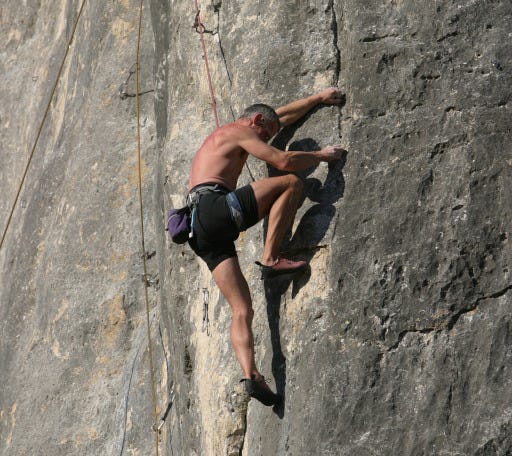The Pursuit of Happiness or Happiness while in Pursuit
"Better to get your dopamine from improving your ideas than having them validated." - Nat Friedman
I'm closing out a decade's long phase of chasing goals in the interests of creating happiness. Often, these were other people's goals and other people's happiness. For most of them, I was paid quite well for my contributions and efforts. I banked a lot of deferred gratification bucks over those years and I plan on spending them in the next phase of my life - deliberately and intentionally.
A sizable portion of the effort expended for the potential gains of others were of the guaranteed sunk cost, low benefit to me variety. But that's what you do for love or duty or both. It's the experience with this second type of "pursuit of happiness" effort that ends up giving hard-won lessons for how to seek happiness while engaged with the pursuit of whatever the goal is - health, success, repairing the dishwasher, a beer with friends on a Friday afternoon - the goal can be any size or shape.
In my experience, there are two things we need to learn how to control and amplify to make happiness while pursuing a goal a regular occurrence: Mindfulness and anticipation.
I've written previously on the subject of mindfulness and don't have much more to add on that subject in this post. It's the idea of anticipation that has my interest of late and I find the biochemistry of anticipation particularly fascinating. For a long time the neurotransmitter dopamine has been described as a central component of the brain's reward system and how it's involved in helping us feel pleasure after receiving a reward.
More recent research has shown, however, that dopamine has more to do with anticipation than reward. It peaks prior to landing the reward. For example, while reading the menu at your favorite restaurant, dopamine levels begin to rise and peak when you see the waiter approaching the table with your order and is about to put a delicious meal down in front of your hungry self. Free climbing is another example. There are much easier ways to get to the summit if the reward was all about getting to the summit. When free climbing, something I haven't done in years and miss doing, the reward is very much about the journey.
This system of anticipation and reward works the same whether we're about to quench our thirst with a glass of water on a hot day, prepare ourselves for a blind date, or launch a book we've been working on for five years. Same machine, different raw materials. The thing of it is, this system resets to a new baseline after each of these experiences. Over time, preferences emerge as to what we do or don't like. In our hyper-choice easy-access world, this system can start to run out of control. What was novel and exciting yesterday becomes ho-hum and expected today. In short order, the exciting new car becomes just a means for getting from A to B. String hundreds and thousands of these events together and before long the hedonic treadmill baseline rises to an unsustainable level.
Knowing this is how the system works means we can take an active role in maintaining the hedonic treadmill baseline at a healthy and satisfying level. I'm still working out how to do this in a way that's self-sustaining. But several things are clear.
Establish a practice of mindfulness. The authentic kind, not the virtue signalling vanity kind. The kind you can easily access when plans go sideways.
Engaging in difficult things seems to be important. Seek to make the reward as satisfying and deserved as the effort or journey.
Practice unrestrained moderation.
Have several things in play that you're anticipating, some near-term and some far-term. This seems to buffer the effects of arrival fallacy.
Take breaks, abstain even, for short periods from things you enjoy.
This may not work for everyone, but schedule things to anticipate, like phone calls to friends and family, walks in nature, live music concerts, or trips to a museum.
In life, we must choose our regrets. So choose wisely the things that are run through your anticipation machine.
If you have any questions, need anything clarified, or have something else on your mind, please use the comments section or email me directly.
Image by Dieter Ludwig Scharnagl from Pixabay




